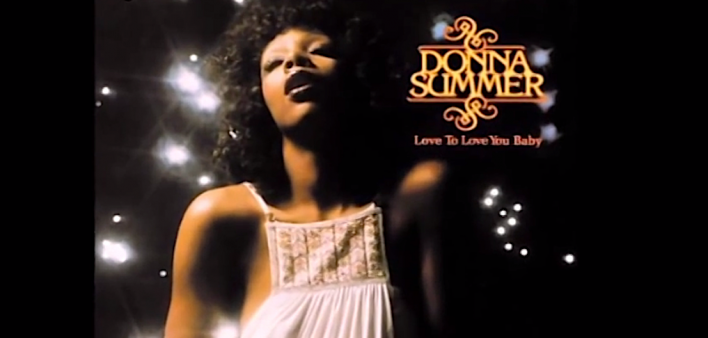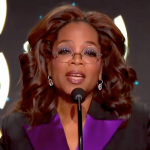I entered a matinee performance of the Broadway show Summer: The Donna Summer Musical with expectations as low as temperatures this spring. Even though I’m part of a chorus of gay men who love disco and Donna Summer’s music, I had no interest in seeing this bio-u-sical, which I’d heard was bland and facile. (I hadn’t read any reviews and still haven’t at the time of this writing.) When a friend offered me a comp ticket, I thought, “How bad can it be.” The show exceeded expectations. It feels like a slick, glitzy well-produced spectacle at an amusement park but with less sex appeal. What I didn’t expect was to exit the theater as angry as Larry Kramer.
I was almost seduced when the show opened to the sound of the real Donna Summer singing “I Feel Love.” The stage was empty, except for a turntable spinning a vinyl LP with that instantly recognizable Casablanca tropical paradise record label. It time-warped me to second grade in 1975. While gay men were listening to DJs spinning “Love to Love You Baby” at the Continental Baths (a breeding ground for disco, the careers of Bette Midler and Barry Manilow, and AIDS), I was listening to my older brother’s 45 of it while playing with G.I. Joe and wishing he were Barbie. I imagined that Donna Summer’s infamous orgasmic moans were the sounds of her dying of knife wounds in an alley and she was professing her undying love for her man with each breath (I’d recently seen a TV movie about Kitty Genovese).
Okay, I told myself, whatever this show’s flaws, accept it for what it is, a jukebox musical that’s going to marinate me in disco nostalgia. I came of age just when disco was proclaimed dead and many of the gay men who birthed it were dying of AIDS. I became HIV positive long after both disco and gay icon Donna Summer were reborn (disco as timeless dance music, she as a Christian). For me she retains her “Queen of Disco” title with “Love to Love You Baby” the all-time best disco song.
After that Casablanca vinyl record started spinning and the stage filled with faux disco dancers I anticipated a subset of hot, shirtless gyrating gay “boys,” the boys in whose clubs disco was born; the boys who formed a chunky, pink triangular piece of her fan base pie. For the rest of the performance I waited in vain for them to show up as if I were trapped in another play. Waiting for GAY-dot?
Summer doesn’t make me angry because it’s devoid of sex despite taking place during one of the sexiest and sex-positive periods in American history. Summer doesn’t make me angry because there are no dancing gay men in the club scenes (those roles are played by shirt-clad drag kings). Summer doesn’t make me angry because the gender-blind casting of women in male chorus roles (none of the lead roles, so it’s not that edgy an artistic choice) is some sort of forced unearned girl power statement. Summer doesn’t make me angry because the drag kings aren’t balanced with chorines of drag queens. Summer doesn’t make me angry because it’s synthetic and didactic. Summer doesn’t make me angry because Barbra Streisand is completely erased from “Enough is Enough” and the famous diva duet is sung by Diva Donna and Disco Donna (there are three Donnas in the show).
Summer makes me angry because it erases the role gay men played in disco and her career.
Summer makes me angry because the words gay, AIDS, and HIV are never uttered by any of the cardboard characters on the stage of the Lunt-Fontanne Theatre.
Summer makes me angry because gay men and AIDS are almost completely rubbed out from Donna Summer’s story.
If the goal of the director Des McAnuff (also the director of the ultimate jukebox musical, Jersey Boys) and the show’s creators is to take us back to the seventies disco era, they missed their mark. It feels more like the eighties when disco died and AIDS was barely mentioned by the White House. The Reagan years. The “Silence = Death” years.
There is one gay character. We know this because he’s effeminate and he quips that the only time it’s not good to be a queen is when you’re the only one in a small town. I think the matinee crowd, made up largely of straight (I’m judging based on the stereotypes of weight and mall attire), white Americans, seemed to get the joke.
Here’s the moment when my feelings about Summer turned from critical disdain to infuriated loathing. Near the end of the show, the gay character stands next to LaChanze as Diva Donna as she sits at the piano as if at a concert. Large light box photographs of gay men at dance clubs (finally!) appear behind her as she tells a story. She says that once she was at a concert in Cleveland (I read it happened in Atlantic City) and was trying to get the “girls” to sing along, but the “boys” kept drowning them out. She wanted to hear the girls, so she says, “It was Adam and Eve, not Adam and Steve.” She explains that she waited too long to deal with her mistake, and by the time she did, it had become a category-five hurricane. The gay character who has been dutifully standing by her says, “Bad joke at the wrong time,” and walks off stage. Then she tells us that she lost a lot of good friends and dear people. But she doesn’t say that those good friends and dear people were gay men (the “boys” who were drowning out the girls, I suppose) and that they were lost to AIDS. Nor are we given the context that this happened in 1983 during the height of the AIDS crisis and the controversy also involved her blaming AIDS on gays for their sins. She is reported to have said: “I’ve seen the evil homosexuality come out of you people... AIDS is your sin. . . Now don’t get me wrong; God loves you. But not the way you are now.” Rather than Diva Donna giving the real Donna a second chance to address the controversy by fully owning it, she gives her a second chance to bungle it.
I looked around at the matinee crowd, who had been singing along and inhaling all the lyrics of the show as if they were free cocaine at Studio 54. I thought, this is the crowd—middle America—for whom the producers and writers created the show, but I don’t think this audience would have upchucked in their fanny packs if Diva Donna had gone a step further and mentioned that she was sorry she ever offended her gay fans, many of whom died of AIDS, or if a couple of men were seen on stage dancing together to “Hot Stuff.” Did the show’s creators really think the matinee crowd couldn’t handle that? Doesn’t this same crowd love the hit Kinky Boots? If the producers were smart, they’d forget evening performances and play this show for matinees, six days a week.
Redacting gay men and AIDS from Donna Summer’s story is like removing Barbra Streisand from the duet of “Enough Is Enough.” Oh, wait. They did that. I guess Barbra is just too gay. In sanitizing this essential and irrevocable part of Donna Summer’s story, they’ve not only created a bland, outrageously dishonest pricey piece of tripe, but have created an infuriating show that’s an insult to gay men, to the memories of everyone who died from AIDS, to those living with HIV/AIDS, and to the intelligence of the matinee crowd. Could I be angrier about Summer? Only if I’d paid to see it.
Jamie Brickhouse is a writer who performs an award-winning solo show based on his critically-acclaimed memoir, Dangerous When Wet: Booze, Sex, and My Mother. He’s at work on a memoir about his father, I Favor My Daddy. Find him on Twitter and Instgram @jamiebrickhouse and at www.jamiebrickhouse.com.








1 Comment
1 Comment